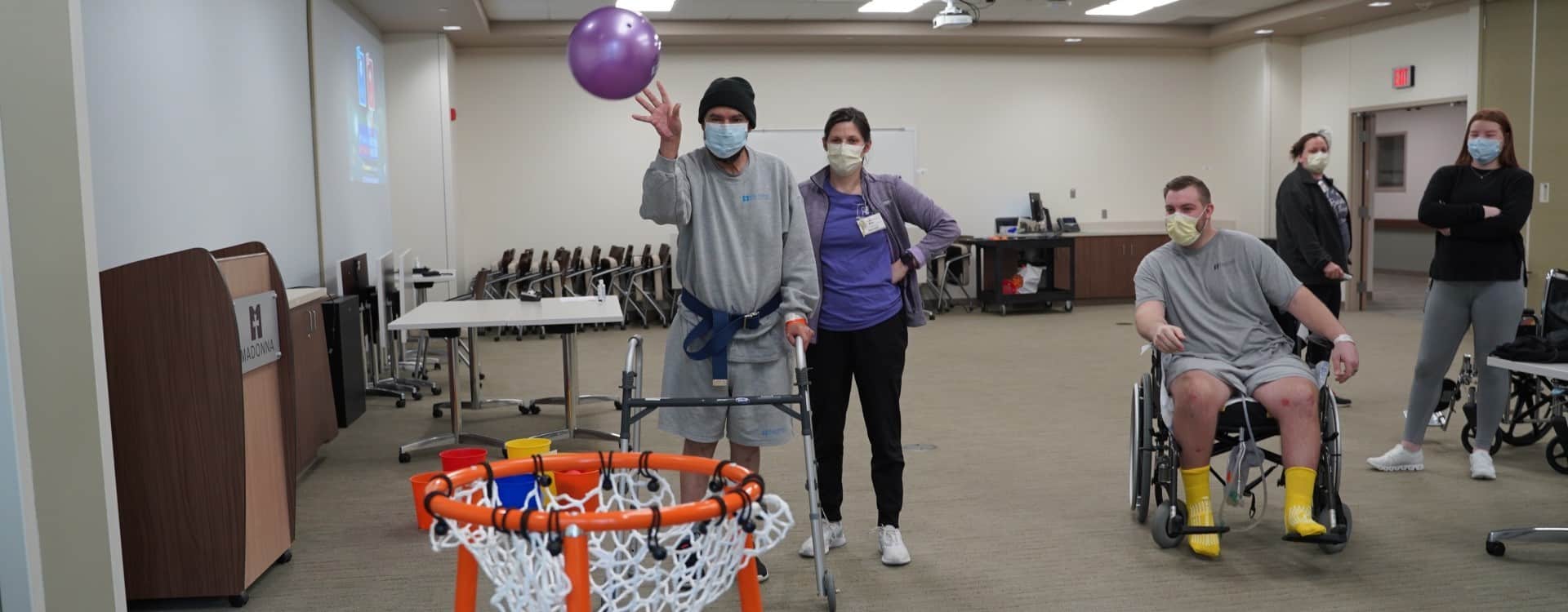Simon Ponce describes himself as a husband, a father, and a hard worker. He doesn’t let a cancer diagnosis define him or detract from his identity. With a little bit of faith and a lot of perseverance, he’s proving a positive attitude can aid in the rehabilitation process.
Simon was diagnosed with esophageal adenocarcinoma with metastasis to his lungs and liver. A recent hospitalization also revealed a tumor near his T6 vertebrae. He came to Madonna Rehabilitation Hospitals from CHI Health Bergan Mercy after surgery to remove the mass near his spine.
“When I got to the emergency room, the doctor told me I needed surgery quick because if they didn’t do it, I’m going to be completely paralyzed,” Simon said. “Thank God everything went well and they sent me here for rehabilitation because everyone has treated me so well.”
Simon arrived at Madonna’s CARF-accredited cancer program very weak and his balance was poor. He wasn’t able to stand on his own and required assistance to complete normal everyday tasks. His goal was to walk again and get strong enough to resume cancer treatment.
When a patient comes to Madonna with a cancer diagnosis, physician-led care teams make adjustments to traditional therapy sessions and take additional factors into consideration.
“The first thing that I always think about is the emotional side of cancer,” Courtney Blank, a Madonna occupational therapist, said. “How people want you to talk to them about it or if they even want you to bring it up. We can just kind of go from there. I always take that into account, but then we also have to think about [it] physically. Are they really fatigued throughout the day? Are they getting enough nutrition and hydration?”
Alex Eilers, a Madonna physical therapist, said it’s important for care teams to work at a moderate intensity with people with cancer.
“We spend a lot of time teaching and we use subjective scales to help guide us,” she said. “We don’t want to push them their hardest because we don’t want them to bottom out. We also talk about activity pacing and planning your day so you have enough energy to complete all the tasks you need to do and want to do.”
At Madonna, patients with cancer can follow any of three different tracks. The first, a restorative track, is for patients who have finished their cancer treatment and seek medical rehabilitation services to restore their prior level of function. They usually see steady improvement in strength and energy throughout their rehabilitation journey. The second track is supportive or compensatory. Interventions focus on energy conservation, compensatory strategies and caregiver training, and the goal is to get the patient strong enough to continue cancer treatment. The final track is a transitional one for people in the end stages of cancer but still want to be at home and have an enhanced quality of life for the amount of time they have remaining. Care teams teach patients and their families how to best be able to cope at home with different equipment and how to safely get through good days and bad ones.
Simon and his care team navigated the compensatory track together. He spent hours each day retraining and strengthening his legs, to the point he was able to walk using only a walker for support. As he got stronger, his care team started incorporating fun activities he could do with his daughter into therapy. He improved his balance using the Nintendo Wii for bowling and enhanced his cognition with dice games. He also showed off his basketball skills at a special March Madness-themed recreation therapy session.
“He had us going because we played the Wii and he wasn’t very good at it, but then we got to the actual basket, he was just making everything from all around the room,” Eilers said. “Now, our goal wasn’t to be good at any of these basketball sports. It was to be on his feet and to be doing something with his hands while he was standing, to be working on that activity tolerance doing something for a long period of time that is fun and engaging.”
Simon and his family also took advantage of different specialized services offered by Madonna. He and his wife utilized a Spanish translator during caregiver training, and he participated in a home safety check with his occupational therapist.
“We walked around the house and we ran into some problems, finding that some of his doors weren’t wide enough for his walker to fit through, so we had to problem solve a little bit,” Blank said. “We learned he’ll have to sidestep through the doors. We had to do some problem-solving and use our imaginations a little bit, but, eventually, we were able to find a way to get him home as independently as possible.”
Now that he’s returned home with a plan for continuing home health services and outpatient therapy, Simon is eager to get back to his life roles as a husband and father, with hopes of returning to his job as a delivery driver at Nebraska Furniture Mart. He is also excited to return to his church, where he and his wife sing onstage. The faith he’s leaned on during his entire cancer journey also inspired the advice he wants to pass on to others who have similar experiences.
“Have faith in God first, because he always delivers for everybody,” Simon said. “I would like to say to everybody to have patience. I know it’s not easy to have patience, and it’s not easy to have all this faith, but if you have faith in Him, everything changes. He can do, and He does, all things if you believe in him.”






